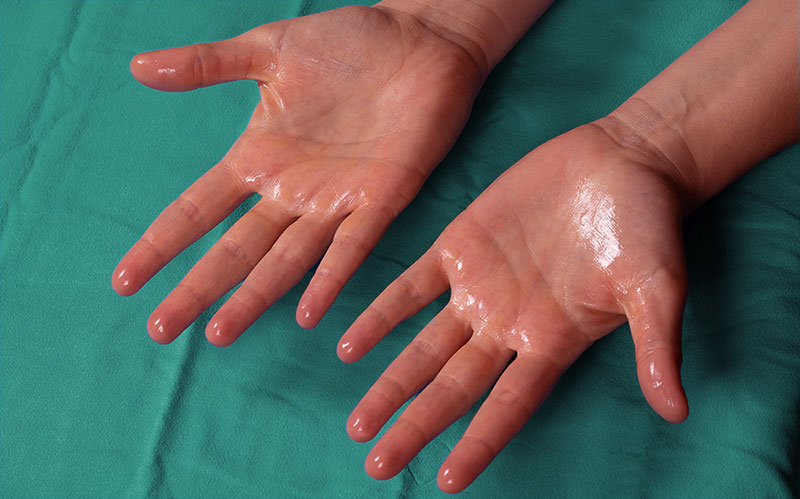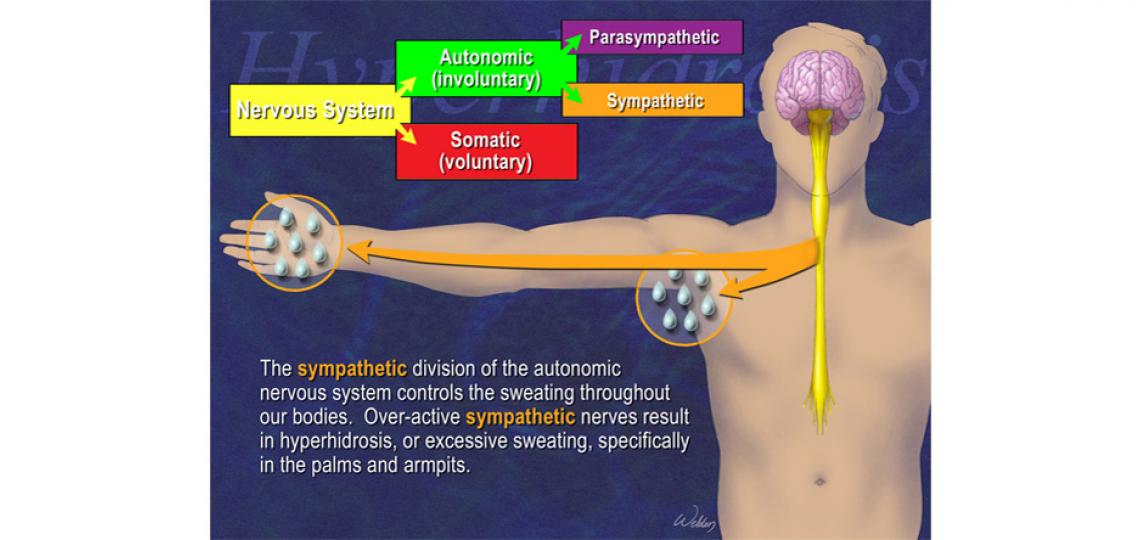Recognizing Excessive Sweating: Dermatology Insights on How to Stop Sweaty Hands
Recognizing Excessive Sweating: Dermatology Insights on How to Stop Sweaty Hands
Blog Article
Recognizing the Root Causes of Excessive Sweating and Its Effect On Day-to-day Live
While it is generally understood as a physiological action to manage body temperature level, the triggers for excessive sweating can vary widely amongst people, including not only physical factors yet emotional and likewise emotional components. By delving right into the origin causes of hyperhidrosis and discovering its diverse effects, a much deeper understanding of this pervasive concern can be gotten, shedding light on the intricacies that individuals grappling with too much sweating navigate on a daily basis.
Physiology of Sweat Glands
The law of sweat production, an essential physical process, is largely managed by the task of sweat glands dispersed across the body. Sweat glands are classified into two major types: eccrine and apocrine glands. Eccrine glands are one of the most various and are located in mostly all locations of the body. They play an important duty in thermoregulation by secreting a watery liquid onto the skin's surface area, which helps and vaporizes cool down the body down. On the other hand, apocrine glands are focused in locations rich in hair roots, such as the underarms and groin, and their secretions are thicker and milky in look.
When the body temperature climbs, either as a result of exercise, high temperature levels, or psychological stress, the anxious system causes the sweat glands to produce sweat. This sweat is composed largely of water and electrolytes like salt and chloride. The process of sweat production is necessary for keeping the body's inner temperature within a narrow, ideal range, highlighting the important duty gland play in human physiology.
Triggers for Excessive Sweating
In recognizing the root causes of too much sweating, it is important to identify the triggers that can lead to this physical reaction. Physical exertion, high temperature levels, and spicy foods are likewise recognized to activate excessive sweating in people prone to this problem.
Additionally, medications such as some antidepressants, opioids, and specific supplements can also work as triggers for hyperhidrosis. Comprehending these triggers is essential in handling excessive sweating successfully - Sweaty hands treatment. By recognizing and attending to the specific triggers that trigger too much sweating in a private, doctor can create customized therapy plans to minimize this problem and improve the individual's top quality of life
Medical Conditions Associated
Related to too much sweating are various medical problems that can aggravate this physiological reaction. One usual problem is hyperhidrosis, a disorder defined by extraordinarily increased sweating that surpasses the body's thermoregulatory requirements. This can show up in focal locations like the palms, soles, underarms, or face, affecting an individual's top quality of life as a result of social embarrassment and discomfort.
In addition, endocrine problems such as hyperthyroidism, diabetes mellitus, and menopausal warm flashes can additionally bring about too much sweating. Hyperthyroidism creates an overflow of thyroid hormonal agents, speeding up metabolic process and activating sweating. Diabetic issues can cause sweating episodes, particularly during hypoglycemic episodes when blood sugar level degrees go down as well low. Menopausal hot flashes, credited to hormone changes during menopause, can cause sudden and extreme sweating, frequently accompanied by flushing and heart palpitations.
Moreover, infections like endocarditis, tuberculosis, and hiv have actually been connected with evening sweats, an usual sign known to interfere with sleep and influence general well-being. These clinical conditions highlight the varied variety of underlying variables that can add to too much sweating, requiring comprehensive evaluation and administration by healthcare experts.
Emotional and Mental Factors

Impact on Social Interactions
Too much sweating can have profound impacts on an individual's ability to engage pleasantly in social communications. The visible indications of sweat discolorations or damp patches on clothing can cause humiliation and self-consciousness, creating people to withdraw from social scenarios. This you could look here withdrawal can impact relationships, limit social activities, and impede individual and professional growth.

Moreover, the stress and anxiety and self-confidence problems originating from too much sweating can influence communication and interpersonal skills. Individuals may struggle to concentrate on conversations, join group activities, or reveal themselves confidently. This can result in feelings of isolation and solitude, as social connections end up being challenging to maintain.
Conclusion

While it is typically comprehended as a physiological response to manage body temperature level, the triggers for extreme sweating can vary widely amongst individuals, encompassing not just physical variables however mental and also psychological aspects. By delving right into the origin causes of hyperhidrosis and discovering its diverse effects, a much deeper understanding of this prevalent issue can be obtained, dropping light on the complexities that people grappling with extreme sweating navigate on a day-to-day basis.
Physical effort, high temperatures, and spicy foods are additionally known to cause extreme sweating in individuals vulnerable to the original source this condition. By continue reading this recognizing and attending to the specific triggers that trigger excessive sweating in a specific, healthcare providers can establish personalized therapy plans to ease this condition and enhance the individual's high quality of life.
Excessive sweating can have profound results on an individual's capacity to engage easily in social communications.
Report this page